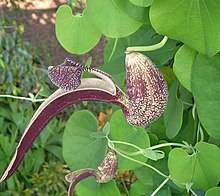Aristolochia is a genus of flowering plants that has intrigued botanists, herbalists, and nature enthusiasts for centuries. These unique plants are known for their distinctive features and intriguing properties. Here are five fascinating facts about Aristolochia:
1. Intriguing Floral Structure:
One of the most remarkable features of Aristolochia plants is their peculiar floral structure. The flowers of many species within this genus bear a resemblance to a curved pipe or a Dutchman's smoking pipe, which has earned them common names like "Dutchman's pipe" or "pipevine." This unusual shape is not just for aesthetics; it serves a specific purpose in their pollination strategy.
2. Clever Pollination Mechanism: The distinctive shape of Aristolochia flowers isn't just for show – it plays a crucial role in attracting specific pollinators. These plants have evolved a strategy to attract certain fly species that are drawn to the foul odor emitted by the flowers. Once the flies enter the flower, they become temporarily trapped due to tiny hairs and slippery walls. This confinement ensures that the flies come into contact with the flower's reproductive structures, aiding in effective pollination.
3. Medicinal Uses and Toxicity: Throughout history, Aristolochia plants have been used in traditional medicine systems for various purposes. However, it's essential to note that many species in this genus contain toxic compounds, including aristolochic acids. These compounds can have harmful effects on humans and animals, causing kidney damage and other health issues. Despite their traditional use, caution should be exercised when considering any medicinal applications involving Aristolochia.
4. Biodiversity and Distribution: The Aristolochia genus is vast, comprising hundreds of species distributed across different regions of the world, from the Americas to Europe, Asia, and Africa. This widespread distribution highlights the adaptability of these plants to various environmental conditions. Each species has its unique characteristics, contributing to the rich biodiversity within the genus.
5. Ecological Significance: Aristolochia plants play a significant role in various ecosystems. Some species are vital hosts for specific butterfly larvae, serving as their food source during the caterpillar stage. This intricate ecological relationship showcases the interconnectedness of different species in maintaining the balance of nature.
In conclusion, Aristolochia plants are captivating organisms with distinctive features and ecological significance. From their pipe-like flowers to their clever pollination mechanisms and essential roles in ecosystems, these plants continue to amaze researchers and nature enthusiasts alike. However, it's crucial to approach their medicinal uses with caution due to their potential toxicity. The study of Aristolochia exemplifies the intricate ways in which plants have evolved to thrive in diverse environments while contributing to the intricate web of life on our planet.




No comments yet
Be the first to share your thoughts!